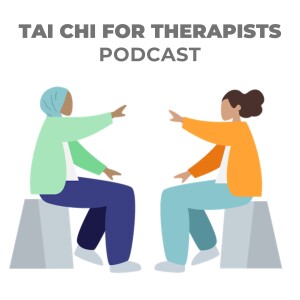
Monday Mar 17, 2025
Ep. 07 Mindful Movement: Enhancing Physiotherapy Practice with Evidence-Based Tai Chi for Chronic Health Conditions
In this episode we're in conversation with Samantha Hewitt, a qualified Physiotherapist and Mindfulness Coach based in Manchester, UK. Sam works part-time in the NHS where she works with a variety of patients including those with complex and chronic health conditions.
When she's not working in the NHS, she runs her own business called, Move More Mindfully Physiotherapy. Sam incorporates tai chi and qigong into her clinical practice as part of mindful movement and functional movement coaching. She finds that Tai chi complements both her Physiotherapy and Mindfulness Coaching practice.
Links
Website: www.movemoremindfullyphysiotherapy.co.uk
Instagram/Facebook: @physiomovemoremindfully
Interview Highlights
Highlights from our conversation with Samantha Hewitt:
- Samantha (Sam) is a physiotherapist in Manchester who works in the NHS and runs her own practice called "Move More Mindfully Physiotherapy".
- Sam combines traditional physiotherapy with mindfulness coaching and Tai Chi, creating an integrated approach to patient care.
- As someone living with autoimmune conditions (thyroid condition and endometriosis), Sam brings valuable lived experience to her practice, helping her empathise with patients facing chronic conditions.
- Sam highlights how fear can potentially create a vicious cycle for patients living with chronic health conditions where they avoid movement due to pain or anxiety which can worsen how they experience their condition.
- Mindfulness coaching doesn't necessarily mean sitting cross-legged and meditating. It can be incorporated into functional movements and daily activities, making it more accessible to patients who struggle with traditional meditation.
- Tai Chi serves as a natural bridge between physiotherapy and mindfulness, offering a "moving mindfulness" practice that addresses both physical and mental aspects of health.
- The approach can be individualised and simplified based on patient needs - Sam often introduces Tai Chi principles without labelling them as such, focusing instead on gentle, curious movement exploration.
- Visual imagery and metaphors (like "being on a little boat that won't capsize") help patients connect with their bodies in new ways.
- For some patients with chronic pain, traditional body scan meditations can be triggering. Tai Chi's mindful movement approach can offer a better alternative by providing distraction while still promoting mindfulness.
- Patients are often surprised by how physically engaging Tai Chi can be, despite its gentle appearance. The standing postures, weight-shifting, and extended arm positions provide effective exercise.
- Sam advises other physiotherapists interested in incorporating Tai Chi to keep it simple rather than feeling they need to learn complex sequences.
- Tai Chi principles can be integrated into standard physiotherapy practice through clinically reasoned exercises that address range of motion, balance and strength.
- Tai Chi aligns well with the biopsychosocial model of healthcare, addressing physical needs while supporting mental wellbeing.
- Sam aims to expand her practice to include more group classes, bringing this holistic approach to more patients.
Summary
This podcast highlights how integrating mindful movement practices like Tai Chi into physiotherapy can provide patients with tools for self-management, particularly those living with chronic conditions, whilst supporting both physical rehabilitation and mental wellbeing.
Listen, rate, and subscribe.
Have you enjoyed this episode? Please take a moment to rate and subscribe, it really helps us keep the podcast going.
Would you like to find out more about our class leading CPD course for health professionals: Tai Chi for Therapists.
We created this course for all registered allied health professionals, clinicians, and other rehabilitation professionals who would like to learn how to implement evidence-based tai chi and qigong movements into their clinical practice.
If you’re a physiotherapist, physical therapist, occupational therapist, occupational or physiotherapy assistant, or other allied health professional visit our course page to find out more.
We look forward to seeing you,
Phil & Helen
Website: www.taichifortherapists.com
No comments yet. Be the first to say something!